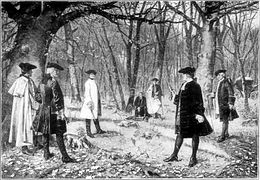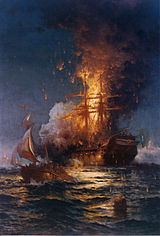
1804
Did you know...
SOS Children, which runs nearly 200 sos schools in the developing world, organised this selection. All children available for child sponsorship from SOS Children are looked after in a family home by the charity. Read more...
| Millennium: | 2nd millennium |
|---|---|
| Centuries: | 18th century – 19th century – 20th century |
| Decades: | 1770s 1780s 1790s – 1800s – 1810s 1820s 1830s |
| Years: | 1801 1802 1803 – 1804 – 1805 1806 1807 |
| 1804 in topic: |
| Humanities |
| Archaeology – Architecture – Art – Literature – Music |
| By country |
| Australia – Canada – France – Germany – Mexico – Philippines – South Africa – US – UK |
| Other topics |
| Rail Transport – Science – Sports |
| Lists of leaders |
| Colonial Governors – State leaders |
| Birth and death categories |
| Births – Deaths |
| Establishments and disestablishments categories |
| Establishments – Disestablishments |
| Works category |
| Works |
| Gregorian calendar | 1804 MDCCCIV |
| Ab urbe condita | 2557 |
| Armenian calendar | 1253 ԹՎ ՌՄԾԳ |
| Assyrian calendar | 6554 |
| Bahá'í calendar | -40–-39 |
| Bengali calendar | 1211 |
| Berber calendar | 2754 |
| British Regnal year | 44 Geo. 3 – 45 Geo. 3 |
| Buddhist calendar | 2348 |
| Burmese calendar | 1166 |
| Byzantine calendar | 7312–7313 |
| Chinese calendar | 癸亥年十一月十九日 (4440/4500-11-19) — to — 甲子年十一月三十日(4441/4501-11-30) |
| Coptic calendar | 1520–1521 |
| Ethiopian calendar | 1796–1797 |
| Hebrew calendar | 5564–5565 |
| Hindu calendars | |
| - Vikram Samvat | 1860–1861 |
| - Shaka Samvat | 1726–1727 |
| - Kali Yuga | 4905–4906 |
| Holocene calendar | 11804 |
| Igbo calendar | |
| - Ǹrí Ìgbò | 804–805 |
| Iranian calendar | 1182–1183 |
| Islamic calendar | 1218–1219 |
| Japanese calendar | Kyōwa 3 Bunka 1 (文化元年) |
| Juche calendar | N/A (before 1912) |
| Julian calendar | Gregorian minus 12 days |
| Korean calendar | 4137 |
| Minguo calendar | 108 before ROC 民前108年 |
| Thai solar calendar | 2347 |
Year 1804 (MDCCCIV) was a leap year starting on Sunday (link will display the full calendar) of the Gregorian calendar and a leap year starting on Friday of the 12-day slower Julian calendar.
Events
January–March
- January 1 – Haiti gains independence from France and becomes the first black republic, having the only successful slave revolt ever.
- February 14 – The First Serbian Uprising begins as an intro into Serbian Revolution. By 1817, Principality of Serbia proclaims self-rule from Ottoman Empire, thus becoming the first nation-state in Europe.
- February 15 – New Jersey becomes the last northern state to abolish slavery.
- February 16 – First Barbary War: Stephen Decatur leads a raid to burn the pirate-held frigate Philadelphia.
- February 18 – Ohio University is chartered by the Ohio General Assembly.
- February 21 – The Cornishman Richard Trevithick's newly-built "Penydarren" steam locomotive operates on the Merthyr Tramroad between Penydarren in Merthyr Tydfil and Abercynon in South Wales, following several trials since February 13, the world's first locomotive to work on rails.
- February – The 1804 Haiti Massacre, an ethnic cleansing, eradicates the white population on Haiti; it is not stopped until 22 April.
- March 7
- John Wedgwood founds the Royal Horticultural Society.
- Thomas Charles is instrumental in founding the British and Foreign Bible Society.
- March 10 – Louisiana Purchase: In St. Louis, a formal ceremony is conducted to transfer ownership of Louisiana Territory from France to the United States.
- March 17 – First performance of Friedrich Schiller's play Wilhelm Tell, at Weimar under the direction of Johann Wolfgang von Goethe.
- March 21 – The Napoleonic Code is adopted as French civil law.
April–June
- April 2 – Forty merchantmen are wrecked when a convoy led by the HMS Apollo runs aground off Portugal.
- April 4 – Samuel Taylor Coleridge aboard The Speedwell sails to the Mediterranean
- April 5 – The first recorded meteorite falls in Possil, Scotland ( High Possil meteorite).
- April 26 – Henry Addington resigns as Prime Minister of the United Kingdom.
- May 10 – William Pitt the Younger begins his second term as Prime Minister of the United Kingdom.
- May 14 – The Lewis and Clark Expedition departs from Camp Dubois and begins their historic journey by traveling up the Missouri River.
- May 18 – Napoleon Bonaparte is proclaimed Emperor of the French by the French Senate.
- June 9 – Beethoven's Symphony No. 3 in E–flat premiered in Vienna.
- June 15 – The Twelfth Amendment to the U.S. Constitution is ratified by New Hampshire, and arguably becomes effective (subsequently vetoed by the Governor of New Hampshire).
July–September
- July 11 – Alexander Hamilton is shot during a duel with Aaron Burr and dies the next day.
- July 27 – The Twelfth Amendment to the U.S. Constitution ratified by Tennessee, removing doubt surrounding adoption.
- August 20 – Lewis and Clark Expedition: The Corps of Discovery, whose purpose is to explore the Louisiana Purchase, suffers its only death when Sergeant Charles Floyd dies, apparently from acute appendicitis.
- September 1 – German astronomer K. L. Harding discovers the asteroid Juno.

October–December
- November 3 – The Treaty of St. Louis (1804) is signed by Quashquame and William Henry Harrison; controversy surrounding the treaty eventually causes the Sauks to ally with the British during the War of 1812 and is the main cause of the Black Hawk War of 1832.
- November 20 – Said bin Sultan, Sultan of Muscat and Oman starts to rule.
- November 30 – The Democratic-Republican-controlled United States Senate begin an impeachment trial against Federalist-partisan Supreme Court of the United States Justice Samuel Chase (he was charged with political bias but was acquitted by the United States Senate of all charges on March 1, 1805).
- December 2 – At Notre Dame Cathedral in Paris, Napoleon Bonaparte crowns himself as the first Emperor of the French in a thousand years (the Napoleonic Code is adopted).
- December 3 – Thomas Jefferson defeats Charles C. Pinckney in the U.S. presidential election.
- December 12 – Spain declares war on Britain
Date unknown
- The Nguyễn Dynasty Emperor Gia Long changes his country's official name from Đại Việt to Việt Nam.
- Père Lachaise Cemetery a 118 acres (0.48 km2) cemetery in Paris, France is founded.
- Morphine is first isolated from the opium poppy by the German pharmacist, Friedrich Sertürner.
- Matthew Flinders recommends that New Holland be renamed Australia (from the Latin "australis" meaning "of the south").
- World population reaches 1 billion people.
Births
January–June
- January 1 – James Fannin, Texas revolutionary (d. 1836)
- January 10 – Elie Frédéric Forey, Marshal of France (d. 1872)
- January 20 – Eugène Sue, French novelist (d. 1857)
- January 21 – Eliza Roxcy Snow, American poet (d. 1887)
- February 7 – John Deere, American industrialist (d. 1886)
- March 8 – Alvan Clark, telescope manufacturer (d. 1887)
- March 14 – Johann Strauss Senior, Austrian composer (d. 1849)
- March 17 – Jim Bridger, American trapper and explorer (d. 1881)
- March 20 – Neal S. Dow, mayor of Portland and Father of Prohibition (d. 1897)
- April 26 – Charles Goodyear, American politician (d. 1876)
- May 16 – Elizabeth Peabody, Transcendental activist, educator (d. 1894)
- June 1
- June 24 – Willard Richards, American religious leader (d. 1854)
July–December
- July 4 – Nathaniel Hawthorne, American writer (d. 1864)
- July 20 – Richard Owen, Anatomist, paleontologist, and zoologist (d. 1892)
- July 28 – Ludwig Feuerbach, German philosopher (d. 1872)
- September 8 – Eduard Mörike, German poet (d. 1875)
- September 14
- October 18 – Mongkut, Rama IV, King of Thailand (d. 1868)
- November 18 – Alfonso Ferrero La Marmora, Italian general and statesman (d. 1878)
- November 23 – Franklin Pierce, 14th President of the United States (d. 1869)
- December 10 – Carl Gustav Jacob Jacobi, German mathematician (d. 1851)
- December 13 – Joseph Howe, Canadian politician (d. 1873)
- December 21 – Benjamin Disraeli, Prime Minister of the United Kingdom (d. 1881)
- December 23 – Charles Augustin Sainte-Beuve, French literary critic (d. 1869)
- date unknown
- Andrew Nicholl, Northern Irish painter (d. 1886)
- James Mackay (New Zealand politician)
Deaths
January–June
- January 4 – Charlotte Ramsey Lennox, British author and poet (b. 1727)
- January 15 – Dru Drury, English entomologist (b. 1725)
- February 6 – Joseph Priestley, English chemist (b. 1733)
- February 12 – Immanuel Kant, German philosopher (b. 1724)
- March 3 – Giovanni Domenico Tiepolo, painter (b. 1727)
- March 16 – Henrik Gabriel Porthan Finnish writer and historian (b. 1739)
- March 21 – Louis Antoine, Duke of Enghien (executed) (b. 1772)
- March 30 – Victor François de Broglie, Duke of Broglie, Marshal of France (b. 1718)
- April 9 – Jacques Necker, French statesman (b. 1732)
- April 11 – Miklós Küzmics, Hungarian Slovenes writer, Catholic priest (b. 1737)
- April 15 – Jean-Charles Pichegru, French general (strangled in prison) (b. 1761)
July–December
- July 12 – Alexander Hamilton, American statesman (killed in a duel) (b. 1755)
- September 4 – Richard Somers, American naval officer (killed in battle)
- October 2 – Nicolas-Joseph Cugnot, French steam vehicle pioneer (b. 1725)
- October 8 – Thomas Cochran (judge), Canadian judge (b. 1777)
- November 5 – Maria Anna Adamberger, actress (b. 1752)
- November 23 – Richard Graves, English writer (b. 1715)
- December 18 – Jacob ben Wolf Kranz, maggid (b. c. 1740)



